Follow us on Telegram for the latest updates: https://t.me/mothershipsg
It took five days, but Malaysia's political impasse has finally come to an end.
After meetings with the leadership of almost every significant party and a summit with the country's head of state, Malaysia's Agong, or king, appointed Anwar Ibrahim as Prime Minister on Nov. 24.
He was sworn in to the post later that day.
The move brings to an end a decades-long quest for the top job, one that had seen Anwar's fortunes take many twists and turns.
At one time the deputy Prime Minister, Anwar went on to endure two separate imprisonments before once again coming within touching distance of the Prime Ministership when Pakatan Harapan (PH) won Malaysia's 2018 General Elections.
Yet it has taken another election — one that PH did not win outright but won the most seats — for Anwar to realise his ambitions.
For something that has at various points seemed like a formality, why has it taken so long for Anwar to become Prime Minister? And who is he actually?
 Image from Anwar Ibrahim's Facebook
Image from Anwar Ibrahim's Facebook
Political beginnings
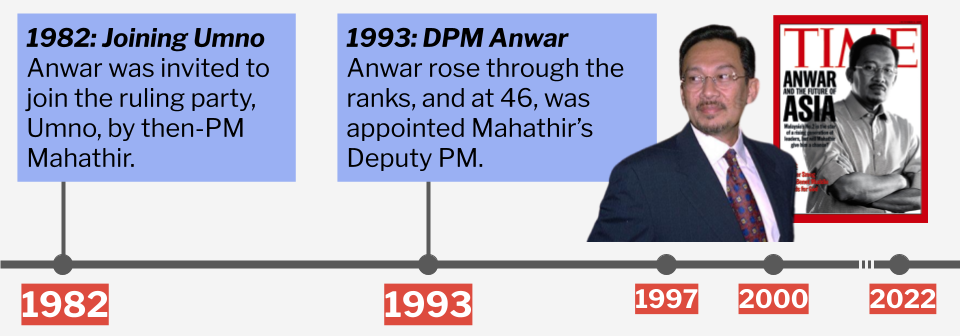
According to Reuters, Anwar cut his teeth in the mid-1970s as a charismatic Islamist student leader and activist who participated in anti-government demonstrations.
He would go on to become a founding leader of ABIM — Malaysia's Islamic youth movement — before making what appeared to be an about-turn by joining Umno in 1982, reported the BBC.
Anwar had been invited to join the governing political party by then-Prime Minister Mahathir Mohamad.
He quickly rose up the ranks, becoming Malaysia's finance minister in 1991.
In 1993, at the age of 46, Anwar was unveiled as Mahathir's deputy Prime Minister; The Straits Times reported that he was widely considered to be next in line for the top job.
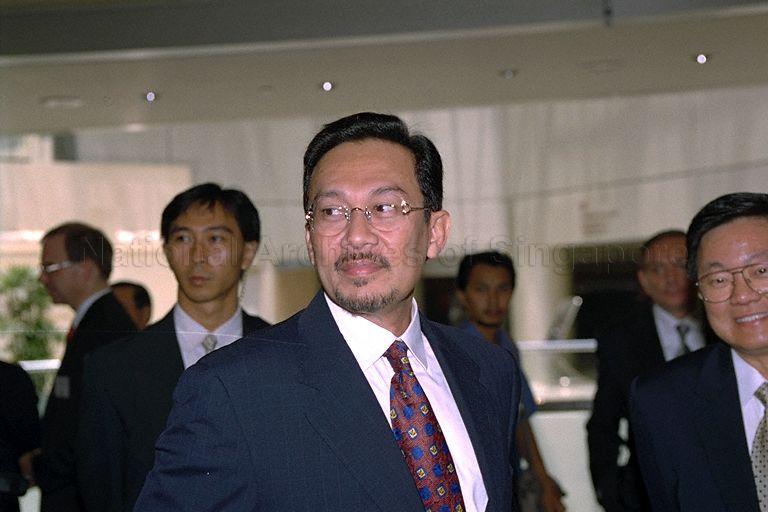 Anwar Ibrahim, circa 1998. Image from Ministry of Information and the Arts Collection, courtesy of National Archives of Singapore
Anwar Ibrahim, circa 1998. Image from Ministry of Information and the Arts Collection, courtesy of National Archives of Singapore
Kicked out of Umno
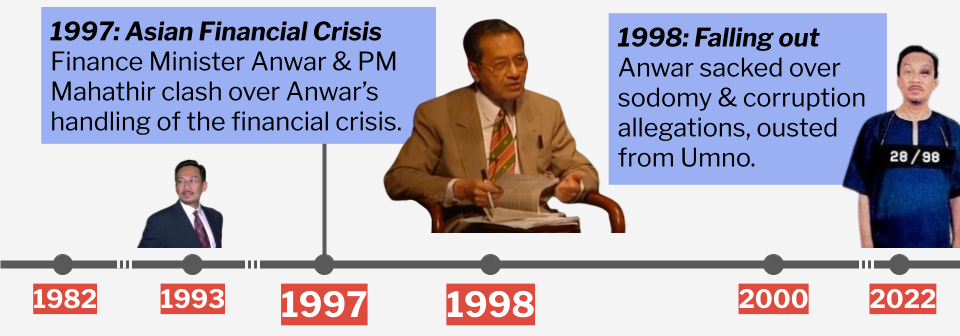
However, his ousting from Umno came just as quickly as his meteoric rise — by 1997, Anwar and Mahathir began to clash over the former's handling of the Asian Financial Crisis.
According to The Guardian, Anwar, in his role as finance minister, had implemented an austerity programme that slashed government spending and deferred infrastructure projects that were important to Mahathir.
In 1998, the pair had officially fallen out after Anwar sought to weed out cronyism and corruption — The Guardian reported that the campaign rankled among others Mahathir's son Mirzan.
Before the year was up, Anwar was sacked from his post and expelled from Umno over allegations of corruption and sodomy, reported the BBC.
His dismissal sparked public protests and is regarded as the start of Malaysia's Reformasi, a reform movement that culminated in Umno's toppling decades later.
But within two years, Anwar had been sentenced to jail — first receiving a six-year sentence for corruption, before he was handed a consecutive nine-year term in August 2000 for sodomy, an act outlawed in Malaysia.
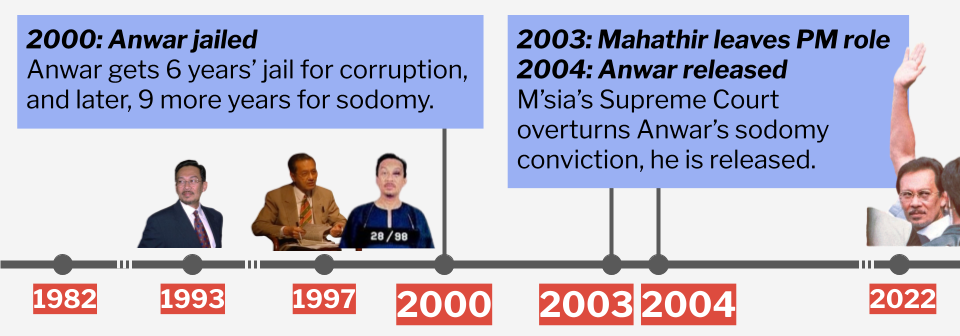
According to the BBC, Anwar has always maintained that his charges were politically motivated.
He was eventually released from prison in late 2004 — one year after Mahathir left the Prime Minister role — when Malaysia's Supreme Court overturned his conviction of sodomy.
He remained banned from taking part in politics until April 2008.
Leader of the opposition
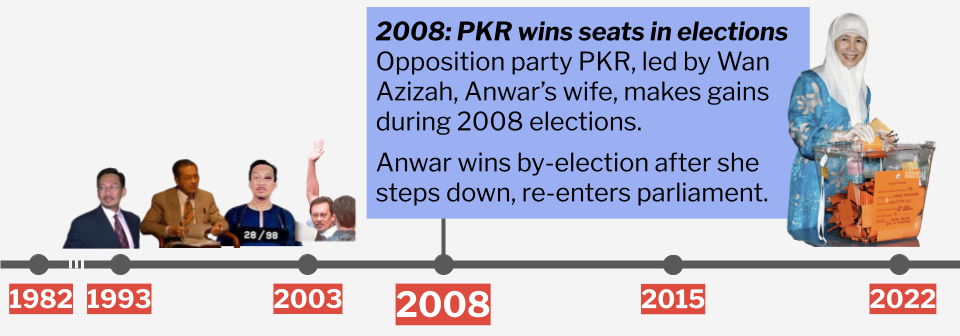
An opposition movement energised by Anwar's presence and helmed by PKR — a party formed and led by Anwar's wife Wan Azizah — made historic gains at Malaysia's 2008 general elections, reported Malaysiakini.
With Anwar still unable to compete — the elections were held the month before his ban from politics expired — opposition political parties seized a third of the seats, consigning the ruling Barisan Nasional (BN) coalition to what was at the time their worst electoral performance.
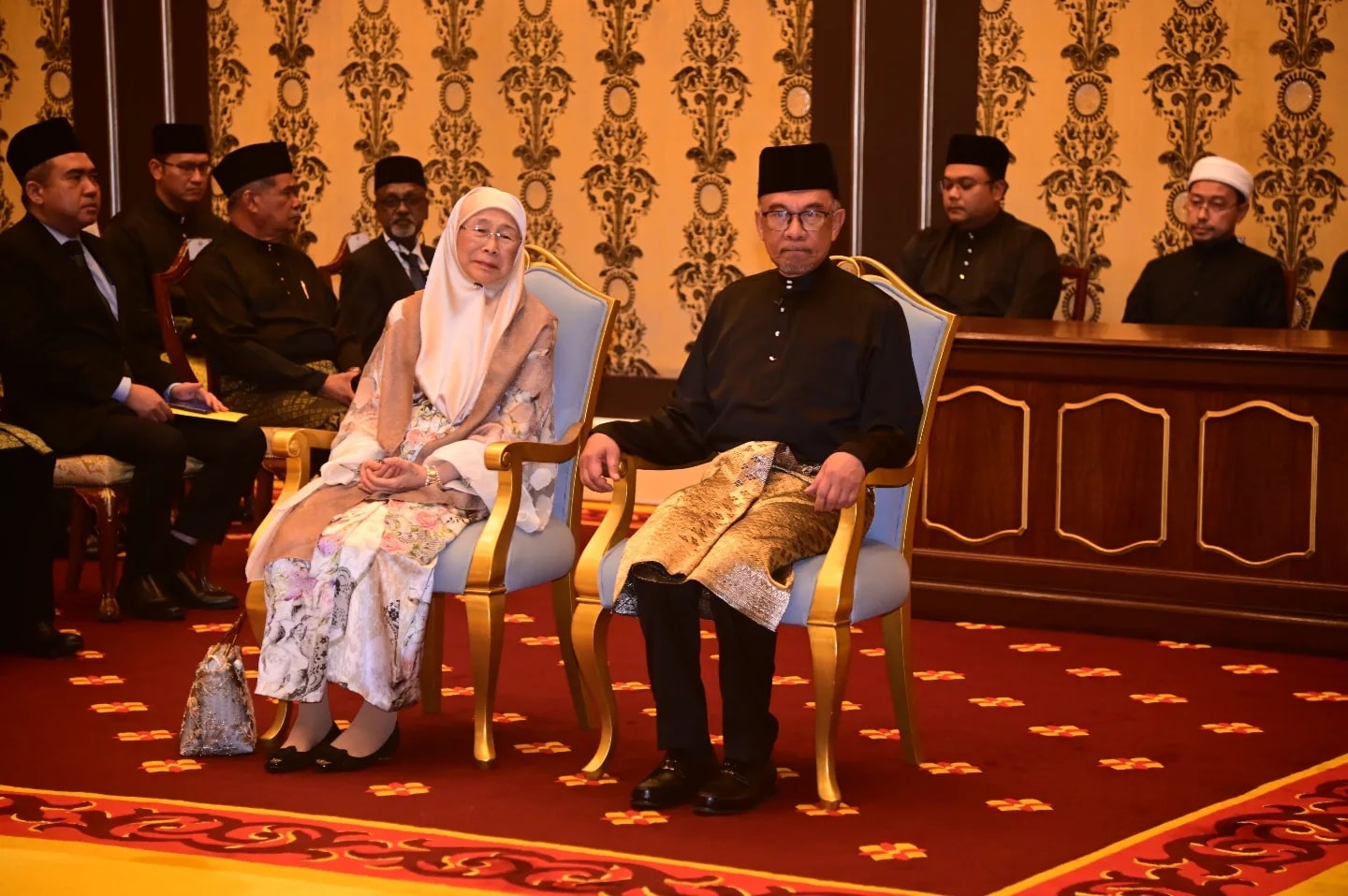 Wan Azizah and Anwar Ibrahim when the latter was sworn in as Prime Minister. Image from Wan Azizah's Facebook page
Wan Azizah and Anwar Ibrahim when the latter was sworn in as Prime Minister. Image from Wan Azizah's Facebook page
Anwar himself would re-enter Parliament as an MP later that year when Wan Azizah vacated her seat, triggering a by-election which he won in a landslide.
According to Malaysiakini, Anwar was sworn into parliament on Aug. 28, 2008, and took his seat as leader of the opposition, directly opposite then-Prime Minister Abdullah Ahmad Badawi's seat.
At the country's next general election in 2013, Malaysia's opposition managed to win more seats once again, reported the BBC, though not enough to wrestle control of the government from BN.
Yet, Anwar would face another stint in jail when in 2015, he was convicted of a second sodomy charge, according to The Star.
Prime Minister in waiting
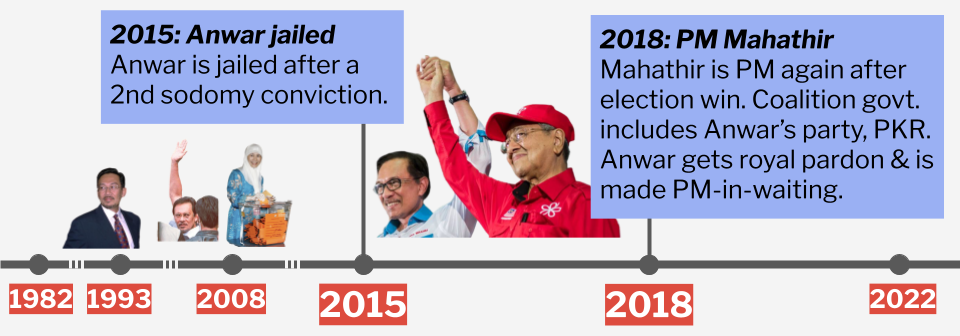
It was during this latest imprisonment when Anwar and former mentor turned rival Mahathir appeared to bury the hatchet.
According to the BBC, the elder statesman had come out of retirement in 2016 at the age of 92, citing his concern over corruption allegations that plagued another protégé — the Prime Minister at the time, Najib Razak.
The new opposition coalition of PH — which included Anwar's PKR and Mahathir's new party Bersatu — pulled off a stunning victory in 2018.
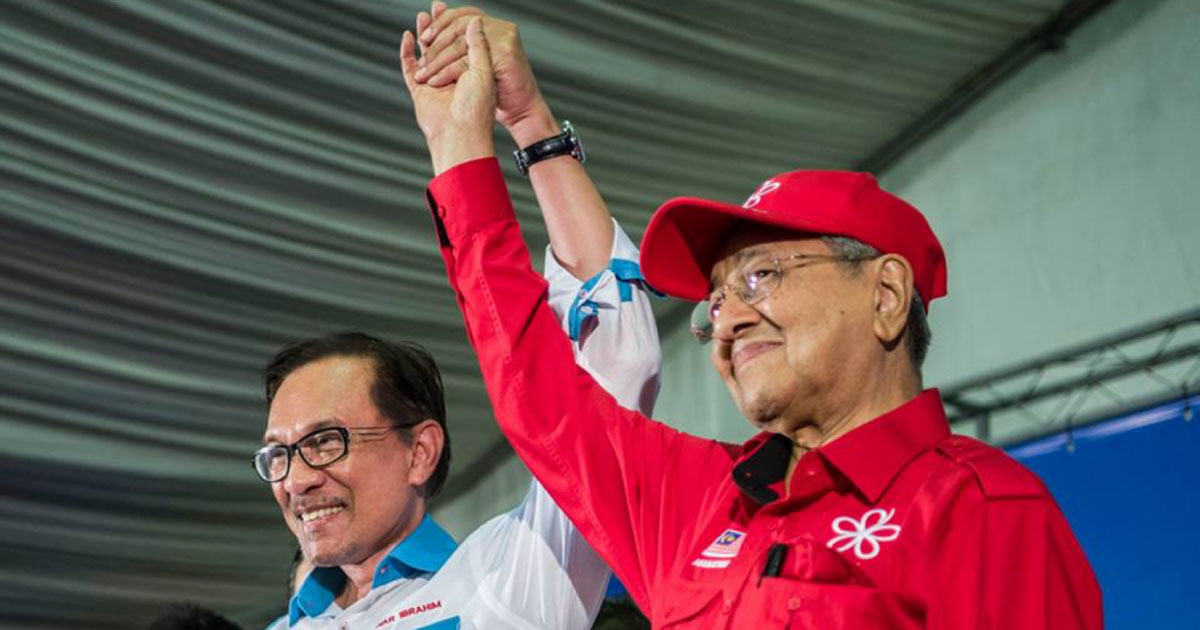 Image from Anwar Ibrahim's Facebook
Image from Anwar Ibrahim's Facebook
Mahathir became Malaysia's Prime Minister once again, and Anwar — who had received a royal pardon — was anointed Prime Minister in waiting with a rough handover timeline of two years set.
Fall of Pakatan Harapan
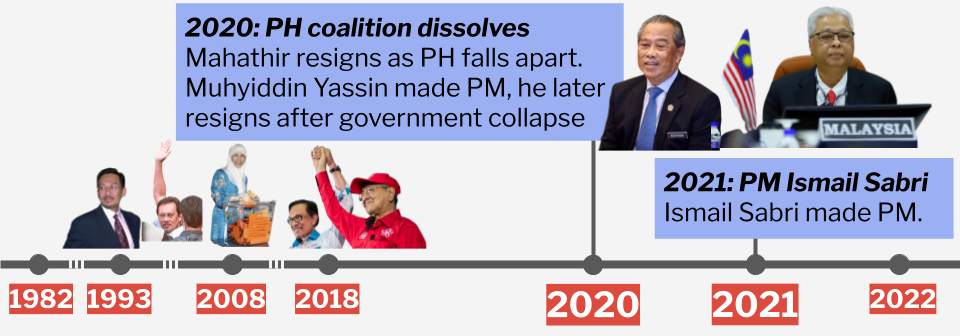
However, it wasn't to be.
Anwar, who was again within touching distance of the post he had coveted for so long, would see his chances of a smooth transition into office evaporate as the ruling PH coalition fell apart.
According to the Associated Press, just 22 months after seizing power, infighting within the coalition culminated in the Sheraton Move, which saw Mahathir resign from the top job, Bersatu exit PH and forming the new governing coalition Perikatan Nasional (PN), and the installation of Muhyiddin Yassin as Prime Minister.
It marked the start of a political crisis — Muhyiddin's government would collapse after about a year and he would be replaced by Umno's Ismail Sabri Yaakob.
The BBC reported that in October 2022, Ismail called for snap elections, with Umno attempting to ride a wave of momentum generated by some by-election victories.
Hung parliament
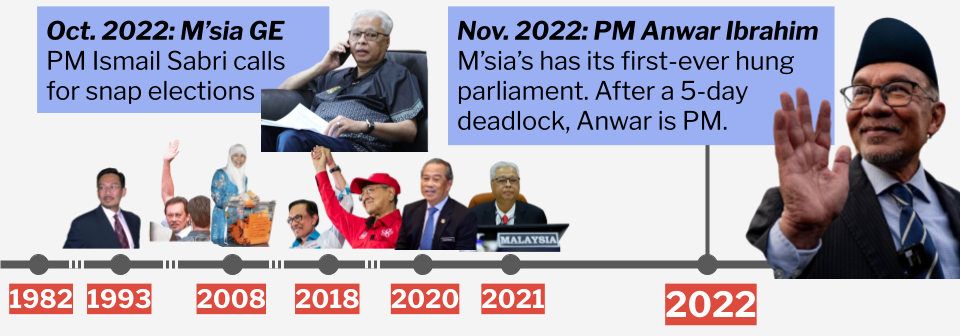
The general elections of 2022 were historic for many reasons.
BN and Umno were handed a withering rejection by Malaysians — once the dominant political force of the country, The Star reported that they only managed to win 30 seats out of the 222-seat Parliament.
Instead, it was PH and PN who looked throughout the election night the most likely to take power.
Yet, they ended up with 82 and 73 seats respectively, short of the simple majority needed to form government.
It was Malaysia's first ever hung parliament.
After days of deadlock, Malaysia's Agong stepped in, and Anwar was declared Malaysia's 10th Prime Minister.
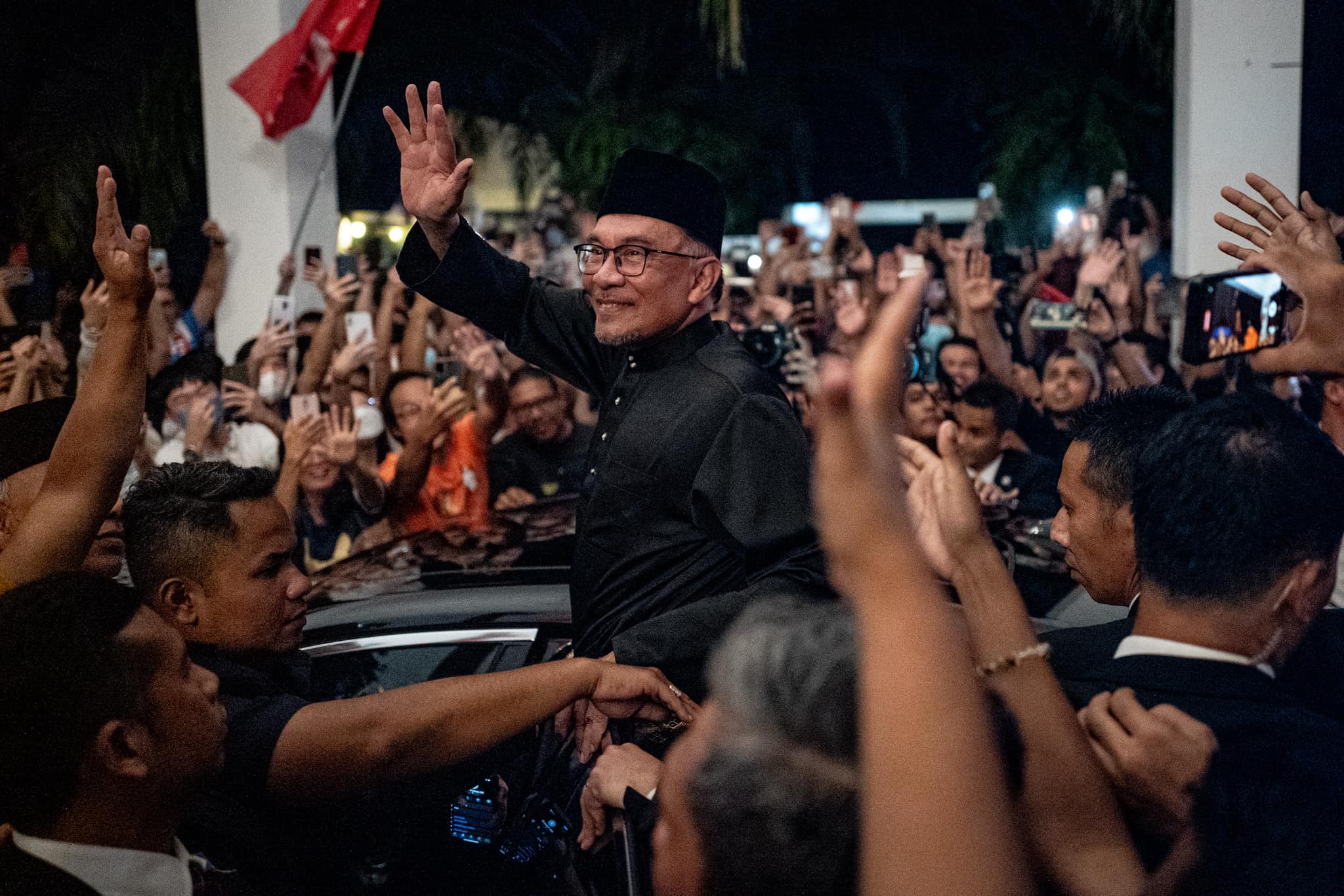 Image from Anwar Ibrahim's Facebook page
Image from Anwar Ibrahim's Facebook page
A unity government
At his first press conference as Prime Minister, CNA reported Anwar as confirming that he would lead a unity government comprising PH, BN, East Malaysia's Gabungan Parti Sarawak, and other parties.
"I want to raise the dignity of the people, end corruption and abuse of power and fight for the lives of the people," he said.
How much success he has with his reformist agenda now that he's achieved his long-held ambition remains to be seen given the tenuous alliance that forms Malaysia's government.
Yet according to the Malay Mail, Anwar will first be setting his sights on tackling bread and butter issues like the cost of living.
"Even if there are some positive (signs) like a stronger ringgit and an improved stock index showing confidence in the new administration, I feel the priority should be given to cost of living and the squeezing effects of prices of goods on the people," he said.
Before he can even get onto that, Anwar will face the first challenge of his tenure — a confidence vote.
The Star reported that Anwar is set to test the strength of his government's support in his very first parliamentary sitting as Prime Minister on Dec. 19.
"Right now, Tan Sri Muhyiddin Yassin has challenged our strength, which he does not need to do, because I’m not a prime minister like him," said Anwar.
"In fact, I have asked Pakatan Harapan to propose a vote of confidence on the first day of parliament."
Related stories:
Top image derived from Anwar Ibrahim's Facebook page
If you like what you read, follow us on Facebook, Instagram, Twitter and Telegram to get the latest updates.
